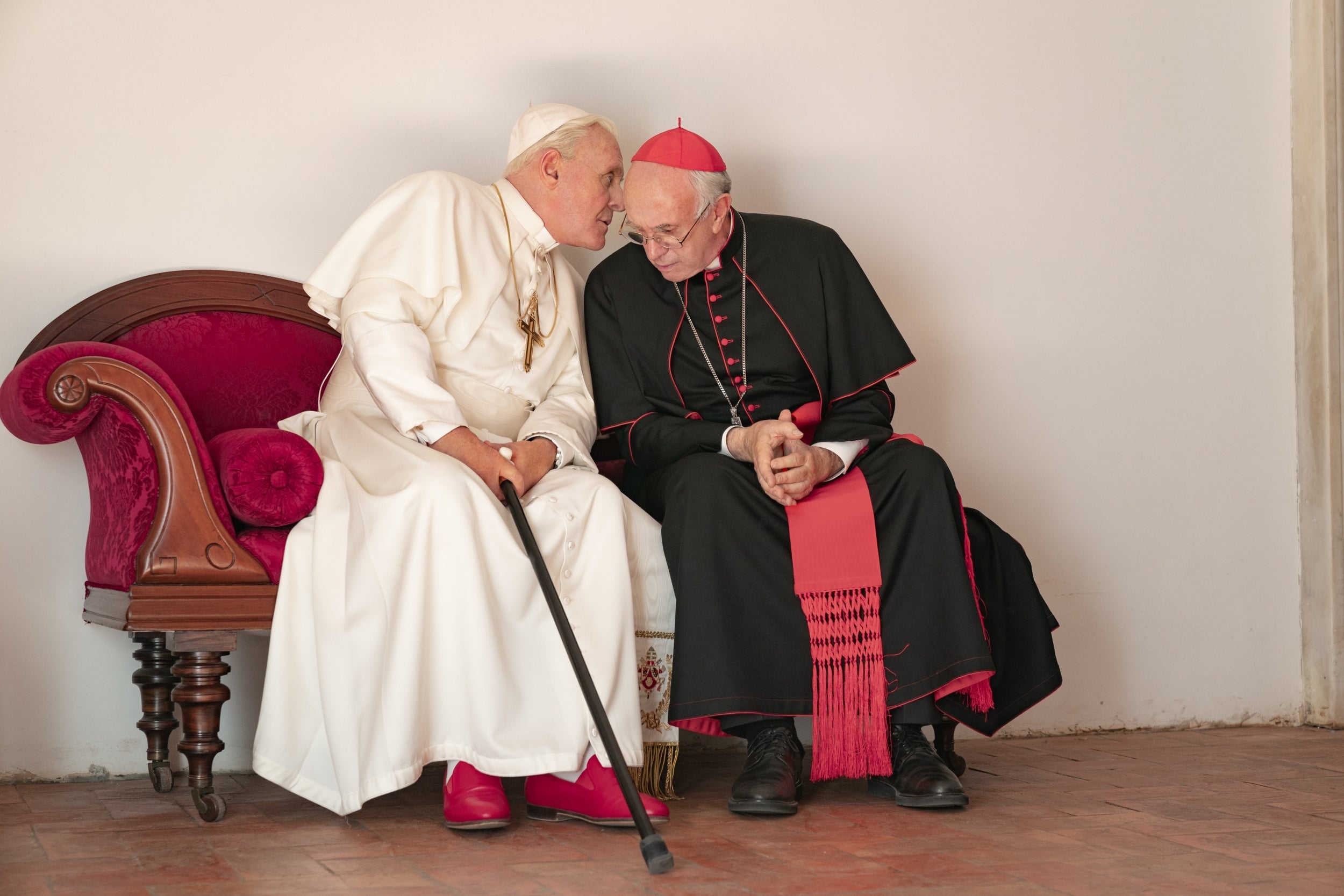The Two Popes review: Anthony Hopkins and Jonathan Pryce bring levity to papal drama
The film has little to say about what it means to be a religious leader today, but it finds unexpected joy within all the austerity and tradition

Dir: Fernando Meirelles. Cast: Anthony Hopkins, Jonathan Pryce, Juan Minujin, Sidney Cole, Lisandro Fiks, Thomas D Williams, Maria Ucedo. 12A cert, 125 mins
Popes don’t quit – they just die. That’s why when Benedict XVI announced his resignation in 2013 it was one of the biggest plot twists the Catholic Church had ever seen – he was the first to do so in almost 600 years. The Two Popes, which sees screenwriter Anthony McCarten adapt his play for the big screen, takes its inspiration from this piece of recent clerical history. It dramatises a handful of meetings between Benedict XVI (Anthony Hopkins) and Cardinal Jorge Bergoglio (Jonathan Pryce), who succeeded him as Pope Francis, while the former considered retirement.
It’s unclear whether these meetings did, in fact, take place or whether there’s any way to ratify what was said during them. But that’s hardly the point here. The Two Popes takes a handful of truths and moulds them into an arresting character study. We see these men sat either side of a spiritual gulf: Benedict is the staunch conservative, while Bergoglio represents the progressive mindset. McCarten’s story, however, suggests that it’s possible for them to find common ground. Theirs is a charming repartee, taking place over pizza and Fanta, or while watching Benedict’s favourite TV show Kommissar Rex (about a crime-solving dog in Vienna). By humanising these two men who are so rigidly puritanical and synonymous with austerity, the film finds an unexpected conduit to joy. Indeed, Bergoglio’s famed humility is treated frequently as a punchline. As pope, he tries to book a plane ticket for himself over the phone, only to get hung up on when the operator assumes it’s a prank.
Pryce always seemed destined to play Pope Francis, considering the countless internet memes that love to point out how similar the two look. But the actor does a lot more than trot out an Argentinian accent and play up to the cameras; he allows a heaviness to settle on Bergoglio’s brow. It suggests a man who’s fought hard to do good but still worries that he comes up short. Hopkins’ Benedict, meanwhile, is very different. On the surface, he’s sharp and frosty, but peel back the veneer and there’s a real vulnerability to Benedict, which Hopkins deftly conveys. Together, the actors’ chemistry is light and unforced, as the popes engage in a strange kind of dance – the push-and-pull of a hearty theological discussion.
Director Fernando Meirelles find his own way to shape the narrative. He cuts through the dreariness of Vatican City bureaucracy by condensing the papal conclave into a zippy, light-hearted montage. We’re guided through the election process by the clicking of ballpoint pens and the flutter of ballot papers being tossed into a pot. But this sense of electricity is both where The Two Popes begins and, essentially, ends as a film. Beyond his clever dramatic exercise, what we get here is actually very little. The issues of child abuse and corruption are brought up at first, then neatly silenced when the film’s ready to look at Benedict with a more forgiving eye.
His final confession is delivered in an inaudible whisper, since the truth of his legacy might spoil the gentleness of the story. His critics call him a “Nazi”, but the film never bothers to point out why this is (he spent part of his childhood in the Hitler Youth). In truth, if you’re looking for any real answers about what it means to be a religious leader today, you’ll be left empty-handed. But there’s a simple pleasure in watching these two actors bring levity to godly men in their stiff robes.
The Two Popes is released in UK cinemas on 29 November and will be available on Netflix from 20 December
Join our commenting forum
Join thought-provoking conversations, follow other Independent readers and see their replies
Comments
Bookmark popover
Removed from bookmarks